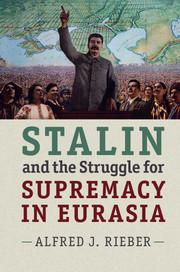Book contents
- Frontmatter
- Dedication
- Contents
- List of maps
- Acknowledgments
- List of abbreviations
- Introduction
- 1 Stalin, man of the borderlands
- 2 Borderlands in Civil War and Intervention
- 3 The borderland thesis: the west
- 4 The borderland thesis: the east
- 5 Stalin in command
- 6 Borderlands on the eve
- 7 Civil wars in the borderlands
- 8 War aims: the outer perimeter
- 9 War aims: the inner perimeter
- 10 Friendly governments: the outer perimeter
- Conclusion: A transient hegemony
- Index
9 - War aims: the inner perimeter
Published online by Cambridge University Press: 05 September 2015
- Frontmatter
- Dedication
- Contents
- List of maps
- Acknowledgments
- List of abbreviations
- Introduction
- 1 Stalin, man of the borderlands
- 2 Borderlands in Civil War and Intervention
- 3 The borderland thesis: the west
- 4 The borderland thesis: the east
- 5 Stalin in command
- 6 Borderlands on the eve
- 7 Civil wars in the borderlands
- 8 War aims: the outer perimeter
- 9 War aims: the inner perimeter
- 10 Friendly governments: the outer perimeter
- Conclusion: A transient hegemony
- Index
Summary
As Stalin's thinking evolved during the war, his strategic aims in the inner perimeter gradually took shape along three converging lines. His first aim was to obtain military bases – “strong points,” as he first called them at the Teheran Conference – on the periphery of the Soviet Union in Europe and Asia; the second aim was a demographic transformation by annexing territories along the frontiers of Finland, Poland, Czechoslovakia and Romania inhabited by nationalities similar to those in adjacent Soviet republics, and by expelling German-speaking populations from Eastern Europe; and the third aim was to promote the establishment of friendly governments on the borders of the Soviet Union. The meaning of friendly governments in the inner perimeter was not, at first, uniformly fixed in Stalin's thinking; it differed most in his attitude toward with European and Asian states. In general, however, friendly states would serve as political buffers and economic providers in rebuilding the Soviet economy.
Strong points and security in Europe
In the early months of the war, Stalin first outlined the territorial dimensions of his war aims in Europe during his negotiations with Anthony Eden on the conclusion of an Anglo-Soviet alliance. His territorial demands in the Middle Eastern and Far Eastern borderlands, while equally well defined, came later, when he began to plan for the war against Japan. His political aims for friendly governments throughout the Eurasian borderlands from Finland to Manchuria evolved more slowly and were subject to change throughout the war and postwar years, reflecting shifts in local conditions and the balance of forces as he perceived them.
In December 1941 Stalin held his first wartime meeting with a leader of his Western allies. He surprised Eden by insisting that the conclusion of a military alliance depended on Britain recognizing the security needs of the Soviet Union: “I think that the whole war between us and Germany began because of these western frontiers of the USSR including particularly the Baltic States. That is really what the whole war is about and what I would like to know is whether our ally, Great Britain, supports us regarding these western frontiers.” He was asking Britain to recognize the territorial expansion of the USSR in the western borderlands that Hitler had endorsed in the pact of 1939.
- Type
- Chapter
- Information
- Stalin and the Struggle for Supremacy in Eurasia , pp. 322 - 355Publisher: Cambridge University PressPrint publication year: 2015



